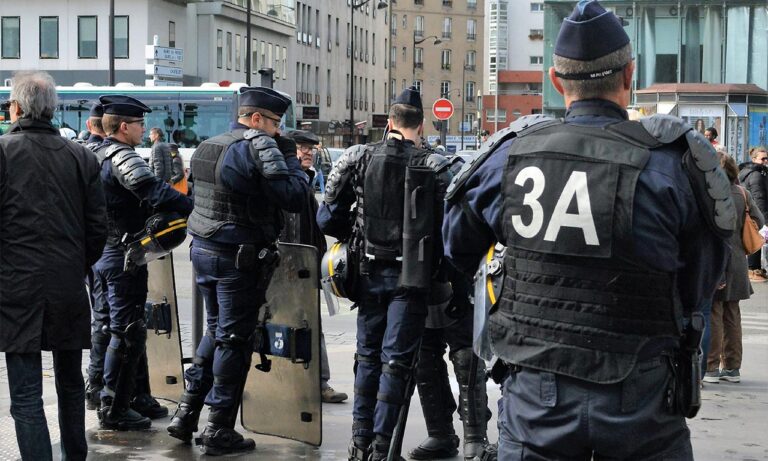French journalist who infiltrated Paris police reveals disturbing pattern of racism and discrimination

Following the brutal and unjustified killing of 17-year-old Nahel Merzouk in the Paris suburb of Nanterre on Tuesday 27 June 2023 by the hands of French police, and the heated riots that resulted from it and have spread across the country since, all eyes have been on the way law enforcement in France have been failing its citizens.
Little did we know, investigative journalist Valentin Gendrot, who specialises in exposing dubious working practices, had already done the work back in 2017 when he applied for a job with the Paris police and managed to successfully infiltrate the force.
Surprisingly (at least to him at the time), Gendrot managed to get through the vetting process without a hitch despite the fact that he was already a journalist and had previously done similar undercover stints in a call centre, a debt recovery agency, and a car plant. Guess the supposed background check all applicants undergo isn’t that extensive, huh?
Once his application was approved, Gendrot became “adjoint de sécurité (ADS),” a position similar to a police community support officer in the UK. After completing the obligatory three months’ training, he was assigned to an unexciting posting at a mental health facility, charged with transporting patients from one psychiatric unit to another.
After serving in this capacity for more than a year, he earned a transfer to Paris’ 19th arrondissement, a neighbourhood known for sometimes volatile nature, where the journalist was finally able to experience front-line policing in the capital. This is when things took a turn for the worse.
Gendrot’s account of his time on the Parisian force, Flic, made waves in France when it was published in 2020. It shed light on a working culture in which racism and misogyny are rife and police regularly exceed their powers without repercussions. Of course today, the police system being a corrupt body should come at no surprise to anyone.
“Officers dealing with members of the public are routinely overfamiliar, inappropriate, aggressive in their words and actions, and insulting, and they unlawfully confiscate merchandise […] from those [unlicensed street hawkers] issued with fines,” wrote Gendrot.
In one particularly disturbing incident, the investigative journalist witnessed an officer beat up an innocent teenager for talking back. The boy, of African heritage, was thrown into a police van and repeatedly punched. Gendrot watched as his colleague went “completely berserk, use[d] his elbow to pin the boy’s chest so he c[ould] lay into him […] like a man possessed.”
When the young victim later filed a complaint, triggering an internal investigation, several officers gave false testimony in support of their co-worker, who was cleared of wrongdoing. In his book, Gendrot wondered, “How can he ever trust the police again after this incident?”
Although his representation of the police force is often unflattering and incredibly worrying, Gendrot made sure to also highlight the struggles members of the police force face on a daily basis. Citing a 2018 report by the French senate into the working conditions of officers serving in the Île-de-France region, the journalist aimed to raise awareness about a number of chronic problems.
Some, such as the stress of regularly dealing with violence, are inherent to the occupation and inevitable (in most cases). Others, like irregular work patterns and long work hours, as well as the pressure of having to meet performance targets, are blamed on French President Emmanuel Macron’s neoliberal managerialism.
The toll of these problems is clear to say the least when looking at the alarming suicide rate among French police officers, which is 36 per cent higher than in the general population. In 2019, the director general of the police force responded to concerns about officers’ mental health by advising local constabularies to organise barbecues to boost morale…
That being said, Gendrot’s insider look into what life on the force is like suggests the prevalence of chauvinistic and racist views is a massive problem. People of non-white heritage are referred to by discriminatory names, meanwhile a male officer repeatedly harasses a female colleague, rigging the work schedule to ensure that she’s always assigned to accompany him on patrols. While sharing a dorm with a fellow ADS, Gendrot wakes one morning to find his roommate with his balls resting on his forehead, taking a selfie.
Talking to The Guardian about his experience, Gendrot explained: “It really shocked me to hear police officers, who are representatives of the state, calling people who were black, Arab or migrants ‘bastards’, but everyone did it.”
He went on to add, “It was only a minority of officers who were violent […] but they were always violent.” When left unchecked, these issues, combined with badly trained and paid police recruits whose backgrounds were barely investigated, we inevitably see more and more tragic events like Merzouk’s shooting take place.





